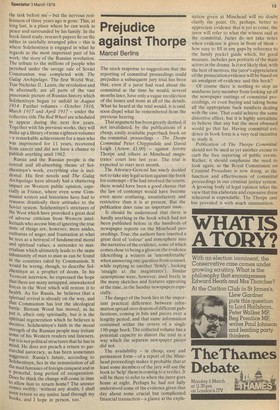Prejudice against Thorpe
Marcel Berlins
The stock response to suggestions that the reporting of committal proceedings could prejudice a subsequent jury trial has been that, even if a juror had read about the committal at the time he would, several months later, have only a vague recollection of the issues and none at all of the details. What he heard at the trial would, it is said, soon dispel what he remembered from the previous hearing.
That argument has been greatly dented, if not invalidated, by the publications of a cheap, easily available paperback book on the committal proceedings — The Thorpe Committal Peter Chippindale and David Leigh (Arrow £1.00) — against Jeremy Thorpe and others at Minehead magistrates' court late last year. The trial is expected,to start next month.
The Attorney-General has wisely decided not to take any legal action against the book for contempt — if he had involved the courts, there would have been a good chance that the law of contempt would have become even more confusing, unsatisfactory and restrictive than it is at present. But the publication does raise an important issue.
It should be understood that there is hardly anything in the book which had not been published before in the hundreds of newspaper reports on the Minehead proceedings. True, the authors have inserted a great deal of 'colour' and atmosphere into the narrative of the evidence, some of which comes close to being a gloss on the evidence (describing a witness as 'uncomfortable' when answering one question from counsel, while replying to another 'firmly', looking 'straight at the magistrates'). Similar Gescriptions were, however, used freely in the many sketches and features appearing at the time, in the Sunday newspapers especially.
The danger of the book lies in the important practical difference between information spread over dozens of different publications, coming in bits and pieces over a lengthy period, and that same information contained within the covers of a single 190-page book. The collected volume has a potential capacity to distort the trial in a way which the separate newspaper pieces did not.
The availability — in cheap, easy and permanent form — of a report of the Minehead proceedings makes it probable that at least some members of the jury will use the book to 'help' them in coming to a verdict. It will be there to refer to when the juror goes home at night. Perhaps he had not fully understood some of the evidence given that day about some crucial but complicated financial transaction— a glance at the expla nation given at Minehead will no doubt clarify the point. Or, perhaps, better to appreciate evidence that is yet to come, the juror will refer to what the witness said at the committal. Juries do not take notes when evidence is given in front of them — how easy to fill in any gaps by reference to the handy pocket guide which, for good measure, includes pen portraits of the main actors in the drama. Is it not likely that, with the best of motives, the juror's appreciation of the prosecution evidence will be based on an amalgam of evidence and this book?
Of course there is nothing to stop an assiduous jury-member from looking up all the newspaper cuttings of committal proceedings, or even buying and taking home all the .appropriate back numbers dealing with the case. That could achieve the same distortive effect, but it is highly unrealistic to believe that any but the most obsessed would go that far. Having committal evidence in book form is a very real incentive to study it.
Publication of The Thorpe Committal should not be used as yet another excuse to curb the free reporting of public events. Rather, it should emphasise the need to look again, as the Royal Commission on Criminal Procedure is now doing, at the function and effectiveness of committal proceedings in our criminal justice system. A growing body of legal opinion takes the view that this elaborate and expensive dress rehearsal is expendable. The Thorpe case has provided it with much ammunition.


































 Previous page
Previous page